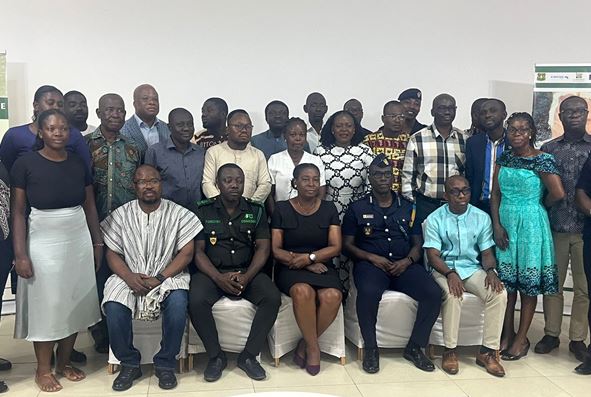By Christabel DANSO ABEAM
The domestic forestry sector is grappling with excessive timber-trafficking, leading to an estimated revenue loss of US$200million annually.
Timber trafficking takes place when loggers harvest and transport timber without complying with the country’s forestry regulations, dodging taxes, royalties and fees that should boost government revenues. This situation threatens both the timber sector’s sustainability and the country’s ability to preserve its forest ecosystems.
According to National Director at A Rocha Ghana – a civil society organisation, Dr. Seth Appiah-Kubi, illegal logging and smuggling timber are undermining the country’s economy – robbing potential resources from one of its key natural resources.
He made this revelation during a national stakeholder workshop on third-party civil society organisation (CSO) transboundary monitoring of timber trafficking in Ghana.
A lack of broad, consistent coordination among law enforcement agencies and limited capacity in science-based wood identification methods remain key challenges in the fight against timber trafficking, say experts.
The workshop saw a sharing of key findings from field monitoring activities that have been carried out by A Rocha Ghana and CSOs partners – such as Community Partners for Development (COMPAD Ghana), Organisation for Indigenous Initiatives and Sustainability (ORGIIS) and The Resource Foundation, among other stakeholders.
The project forms part of the United States Forest Service (USFS) Anti-Timber Trafficking project currently being implemented in partnership with the Forestry commission (Timber Industry Development Division). It aims to contribute effectively in addressing drivers of illegal logging and timber trafficking along the supply chain by implementing a third-party framework led by CSOs in Ghana, ultimately contributing to sustainable forest management and conservation.
“The forestry sector is estimated to contribute about 6 percent of Ghana’s gross domestic product, with the timber industry’s contributions as of 2022 being estimated at GH¢1.6billion; and it’s also a source of employment for over 200,000 people,” he said.
Despite all efforts to stop this illegal activity through the Ghana Wood Tracking Systems (GWTS), Dr. Appiah-Kubi established that the problem continues to persist due to weak law enforcement, porous nature of the country’s borders, weak institutional collaborations and capacities, among others.
The National Director is hopeful that a collective effort from all key stakeholders in the value chain will significantly help resolve the situation at hand.
The Transboundary monitoring project and key activities
The project is being implemented in hotspot areas across the Upper East and West Regions, led by ORGIIS Ghana. In the Bono Region it is led by COMPAD Ghana and Western North Region by The Resource Foundation.
The key activities implemented under the project include: awareness creation on illegal timber trade and trafficking through community sensitizations; rollout of radio jingles in local languages; and radio talk shows.
Also, CSO partners have been trained on the use of SMART application and Xyloris PocketWood ID for monitoring and reporting timber infractions along timber trade routes in the various landscapes.










